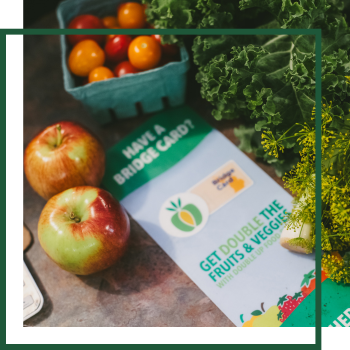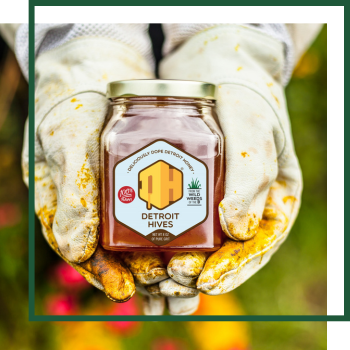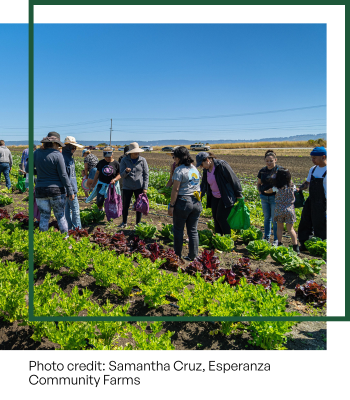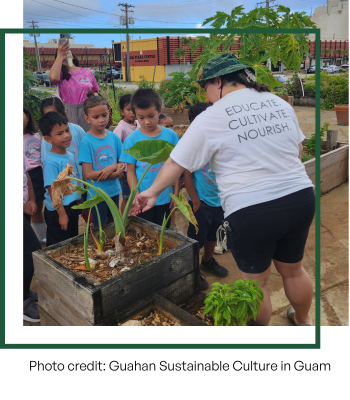Advocacy in Action
Highlight
Advocacy in Action
Championing polices that bring proven, restorative solutions to scale.

Nationwide
The 2023 farm bill is a critical juncture in the national effort to improve nutrition security for the approximately 40 million low-income families and individuals who rely on SNAP. As the largest federal investment in our food and farming systems, SNAP distributes more than $80 billion per year, much of it to families struggling to put food on the table.
To ensure that those dollars provide fresh, locally grown food options for communities around the country, Fair Food Network’s policy team uses its experience on the ground and in the legislature to channel funding and political momentum toward restorative solutions like nutrition incentives and produce prescription programs. Our advocacy efforts in 2022 helped to set the stage for negotiations around the 2023 farm bill and bring proven solutions to scale at the state level.
In 2022, Fair Food Network led a collective effort to advance federal policy priorities for the Gus Schumacher Nutrition Incentive Program (GusNIP) by establishing the Alliance for National Nutrition Incentives (ANNI). ANNI includes member organizations that range from industry trade groups, such as the Farmers Market Coalition and National Grocers Association, and consumer advocacy organizations like Union of Concerned Scientists and Center for Science in the Public Interest, to nonprofit health agencies like the Academy of Nutrition and Dietetics and the American Heart Association. ANNI also intentionally engages lower capacity, grassroots, and BIPOC-led organizations—those that have often been underrepresented in the policy development process—in defining priorities.
The disparate stakeholders that comprise ANNI—ranging from agriculture, anti-hunger, public health, retail advocacy, and other interests—share support for the Gus Schumacher Nutrition Incentive Program (GusNIP, formerly FINI), which was established in the 2014 farm bill with strong bipartisan backing. GusNIP provides funding for produce prescription and nutrition incentive programs like Double Up Food Bucks, helping SNAP participants access and choose more fresh fruits and vegetables for their families in 48 states.
“Very few farm bill programs attract bi-partisan engagement as broadly as fruit and vegetable incentives. When all those different voices are singing in harmony, it can be a beautiful and highly impactful tune,” said Mark Nicholson, senior director of policy at Fair Food Network. “We are so heartened by the diverse engagement from the GusNIP advocacy community around collective priorities for the 2023 farm bill.”
In 2022, ANNI worked through open dialogue and collaboration to first identify areas of mutual agreement that the diverse group of GusNIP stakeholders can advance together. Coalition members determined a set of priorities that could garner broad support and in 2023 introduced these priorities in draft farm bill legislation, calling for a number of modifications to the current GusNIP policy. One such change would be the reduction or elimination of the federal match requirement for GusNIP grantees. Programs applying for GusNIP funding are required to secure a one-to-one match, meaning that they must find funding sources to match, dollar for dollar, the awards they receive through GusNIP. This requirement of GusNIP grantees is especially burdensome for first-time applicants to the program and is often prohibitive enough to keep some programs from applying for GusNIP funding altogether. Coalition members agreed that the match requirement was inhibiting the growth and expansion of nutrition incentive and produce prescription programs, no matter their size. To alleviate this burden and strengthen our collective capacity and impact, the ANNI coalition is advocating for the reduction of the match requirement to 25% of the federal award, and the total elimination of the requirement for pilot programs.
In addition to advocating for a reduction in the match requirement, ANNI is working to ensure adequate funding for nutrition incentive and produce prescription programs, as well as recommending changes to improve coordination between the federal agencies responsible for GusNIP. To ensure these priorities are included in the 2023 farm bill, Fair Food Network and representatives of ANNI have worked to increase policymakers’ awareness of the importance of healthy food incentives. The coalition has convened with key policymakers as an opportunity to establish and strengthen relationships, as well as convey the impact and success of nutrition incentive and produce prescription programs and the challenges they face sustaining and scaling those impacts.
“One constant in Washington is the high turnover of both elected officials and their staff, especially across the five-year farm bill cycle. This requires ceaseless education and engagement on the Hill,” commented Nicholson. “The ability to share broad coalition policy priorities with legislative staff is a tremendous value-add for them as well as the community we advocate for.”
Fair Food Network’s policy advocacy work extends to the state level as well, where we worked with programs in New York, Mississippi, and Texas to successfully lobby for first-time state funding of nutrition incentives and similarly helped to position Double Up in New Jersey for success in its ongoing campaign for state funding. Our engagement with state appropriators and budget officials in 2022 has succeeded in demonstrating the imperative of sustaining the Double Up program in our home state of Michigan, as well: In June 2023, Michigan legislators announced funding for Double Up Food Bucks totalling $4.9 million through the end of 2024. The coordinated effort of our policy team to advocate for state funding of Double Up Food Bucks means that families in communities as far apart as Syracuse and Gulfport and Flint will continue to have consistent and local access to locally grown fruits and vegetables.
Success in achieving our 2023 policy objectives has helped to scale programs for statewide reach and laid the groundwork for a bipartisan farm bill that we anticipate will make fruits and vegetables more accessible to all SNAP recipients.
“Every farm bill has built upon earlier success for the GusNIP community, and our hope is that 2023 is no different,” commented Nicholson. “As fruit and vegetable incentives continue to grow its innovation and evaluation and scale nationally, the Alliance for National Nutrition Incentives, powered by our advocacy expertise, is setting the stage for increased support in the current farm bill and also helping to build a movement for long-term systemic change.”

 Double Up Food Bucks
Double Up Food Bucks Fair Food Network’s own Double Up Michigan team aims to help families bring home healthy fruits and vegetables while supporting Michigan farmers, in this case by working with grocers and food distribution networks to create more connections between what’s being grown locally and what’s available on store shelves. “Independent stores want to offer more fresh, local options, but they often don’t have the infrastructure, sourcing connections, or volume needed to access Michigan-grown produce consistently,” says Charles Walker, retail specialist. “They need support to bridge that gap—so they can be part of the solution in bringing healthy food closer to home.” Double Up Michigan aims to ensure the nearly 30 food retail locations in the city buy 20% or more locally grown produce during peak growing season in Michigan as a key requirement of being a part of the program. This helps build the market for Michigan farmers by driving demand for locally grown fruits and vegetables as part of the program model. Double Up Food Bucks in Michigan not only helps people using SNAP benefits but also supports farmer viability and keeps dollars circulating in local economies.
Fair Food Network’s own Double Up Michigan team aims to help families bring home healthy fruits and vegetables while supporting Michigan farmers, in this case by working with grocers and food distribution networks to create more connections between what’s being grown locally and what’s available on store shelves. “Independent stores want to offer more fresh, local options, but they often don’t have the infrastructure, sourcing connections, or volume needed to access Michigan-grown produce consistently,” says Charles Walker, retail specialist. “They need support to bridge that gap—so they can be part of the solution in bringing healthy food closer to home.” Double Up Michigan aims to ensure the nearly 30 food retail locations in the city buy 20% or more locally grown produce during peak growing season in Michigan as a key requirement of being a part of the program. This helps build the market for Michigan farmers by driving demand for locally grown fruits and vegetables as part of the program model. Double Up Food Bucks in Michigan not only helps people using SNAP benefits but also supports farmer viability and keeps dollars circulating in local economies. This
This While Danu Hof Family Farm is expanding its operations to meet growing demand, other awardees, such as
While Danu Hof Family Farm is expanding its operations to meet growing demand, other awardees, such as  to improve underserved communities for both people and pollinators by transforming blighted vacant lots into
to improve underserved communities for both people and pollinators by transforming blighted vacant lots into The Hub’s capacity building awards are one way that Fair Food Network is supporting partners who are scaling innovations that contend with nutrition insecurity. As program partners demonstrate the value of these innovations, they are shared with others in the field. “One of the reasons we started the program during the pandemic is because so many federally funded programs were experiencing the same challenges like how to pay for PPE or pivot operations to meet COVID protocols,” says Fair Food Network’s Senior Director of Nutrition Incentives, Erica Christensen Raml. “Since then, the focus of the fund has evolved to continue meeting the changing times. We have found that certain barriers to program usage — like transportation issues or language access — are common program-wide.”
The Hub’s capacity building awards are one way that Fair Food Network is supporting partners who are scaling innovations that contend with nutrition insecurity. As program partners demonstrate the value of these innovations, they are shared with others in the field. “One of the reasons we started the program during the pandemic is because so many federally funded programs were experiencing the same challenges like how to pay for PPE or pivot operations to meet COVID protocols,” says Fair Food Network’s Senior Director of Nutrition Incentives, Erica Christensen Raml. “Since then, the focus of the fund has evolved to continue meeting the changing times. We have found that certain barriers to program usage — like transportation issues or language access — are common program-wide.” Together with our partners, Fair Food Network is supporting growing demand and helping nascent programs -— from Esperanza Community Farms in Watsonville, CA, to Knowledge Quest in Memphis, to Guahan Sustainable Culture in Guam — to explore innovative methods for service delivery and build organizational capacity to apply for and implement the large federal awards that make the impacts of nutrition incentive and produce prescription projects possible. And while each community’s program has the freedom to adapt to local needs, all — whether new or already established — are finding innovative ways to provide healthy food options for families who need it most, increase sales and expand the customer base for participating businesses, and produce more income for local farmers. “Capacity building grants give us a chance to provide additional support to communities that are innovating in scalable ways and can serve as models of resilience for the nutrition incentive field,” says Raml. “And they’re also a way to fund some really great ideas.”
Together with our partners, Fair Food Network is supporting growing demand and helping nascent programs -— from Esperanza Community Farms in Watsonville, CA, to Knowledge Quest in Memphis, to Guahan Sustainable Culture in Guam — to explore innovative methods for service delivery and build organizational capacity to apply for and implement the large federal awards that make the impacts of nutrition incentive and produce prescription projects possible. And while each community’s program has the freedom to adapt to local needs, all — whether new or already established — are finding innovative ways to provide healthy food options for families who need it most, increase sales and expand the customer base for participating businesses, and produce more income for local farmers. “Capacity building grants give us a chance to provide additional support to communities that are innovating in scalable ways and can serve as models of resilience for the nutrition incentive field,” says Raml. “And they’re also a way to fund some really great ideas.”
